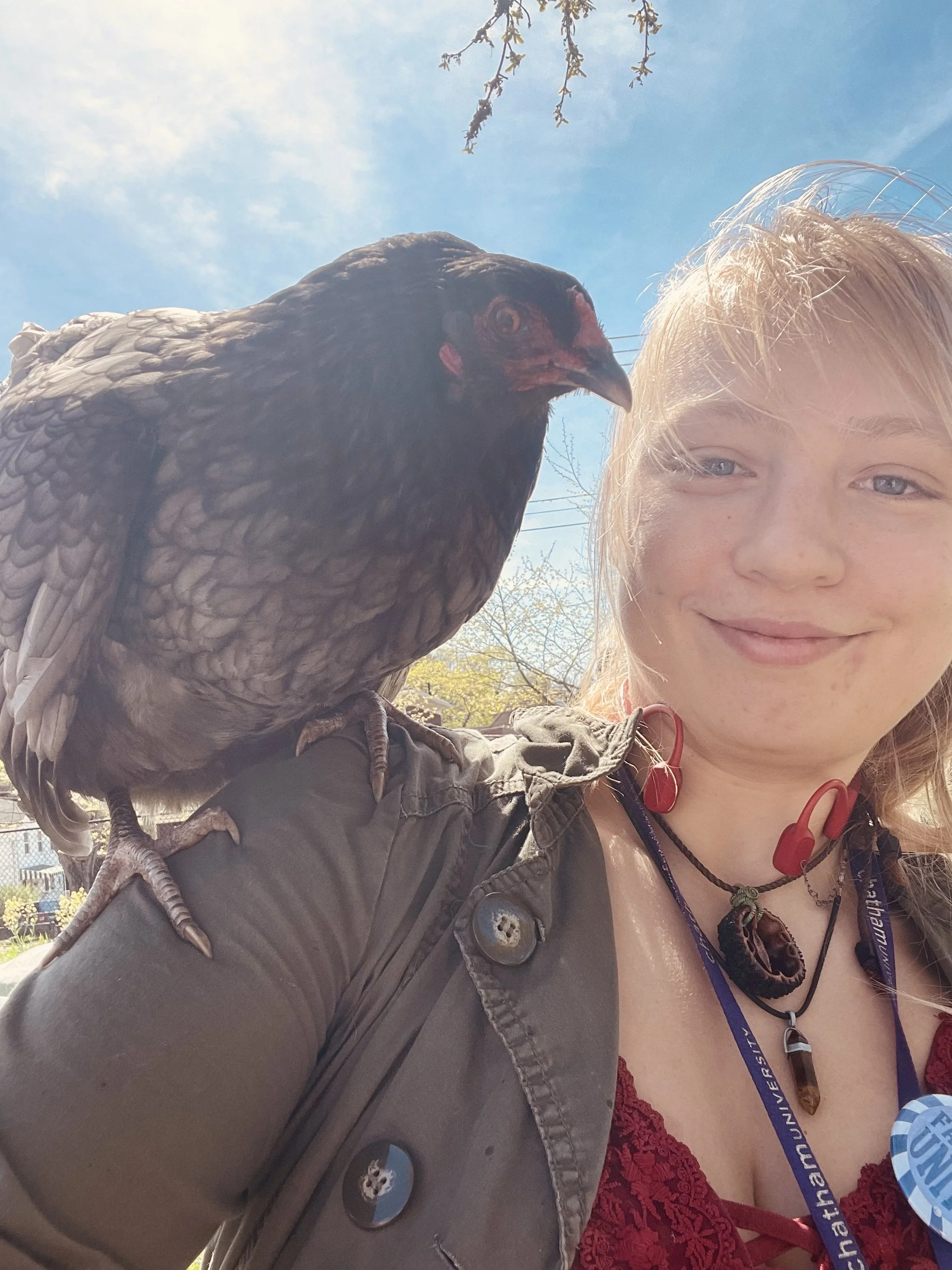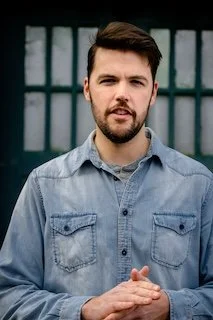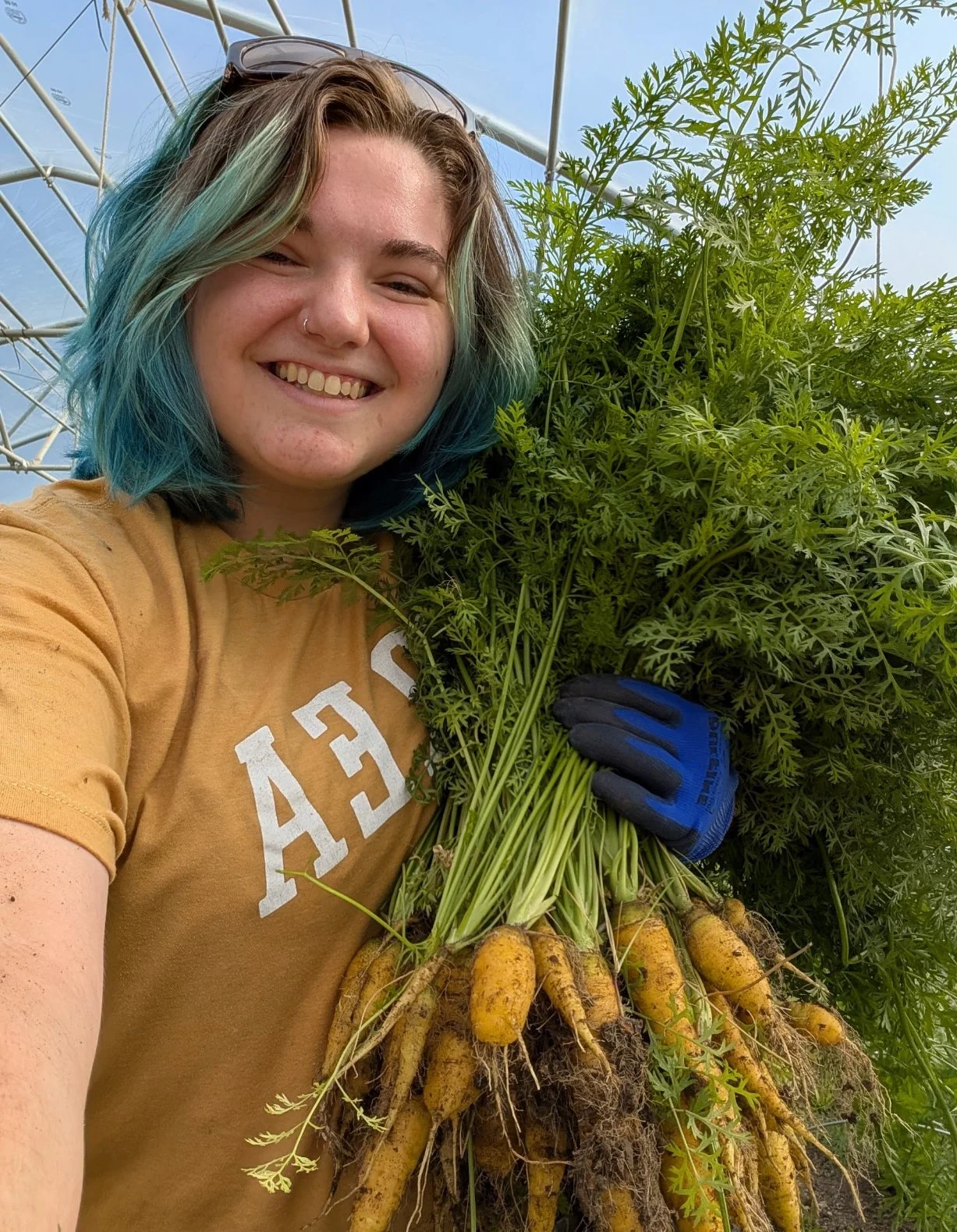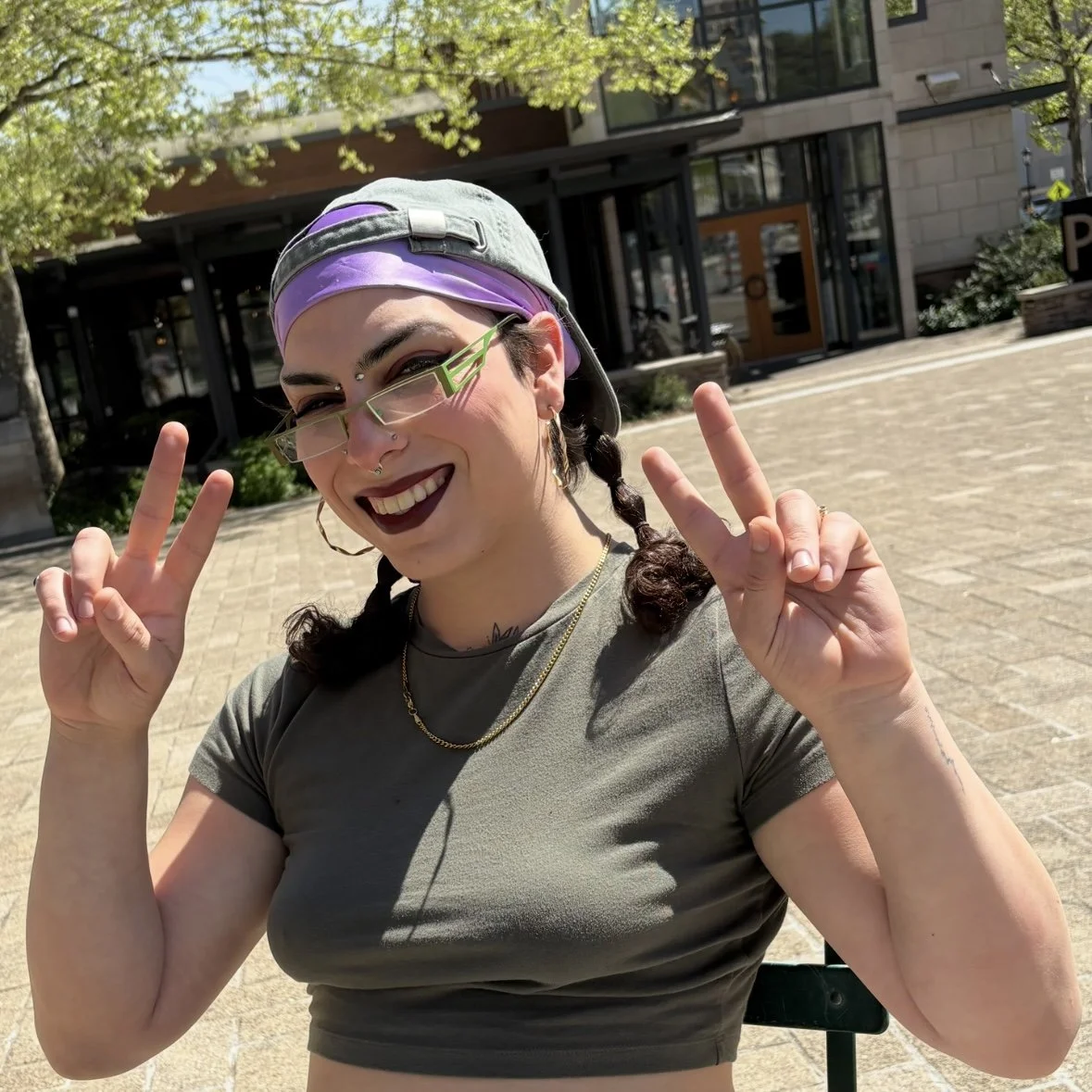Meet the Graduate Students on the 2025-26 Farm and Apiary Teams
Lindsey Disler
(she/they)
Masters in Food Studies
Graduate Assistant
“I believe deeply that regenerative agriculture must address more than soil health and biodiversity - it must also regenerate communities and create equitable economic opportunities. This conviction has led me to focus on the intersection of regenerative practices and cooperative ownership, seeing these as complementary approaches to building truly sustainable food systems. I hope to show that beginning farmers can advance regenerative agriculture not just through individual entrepreneurship which seems to very often lead to farmer burnout, but through collective approaches that distribute both risks and rewards.”
Lindsey has been serving as the Graduate Assistant managing the Agroecology Demonstration Garden at Eden Hall Farm, where she focuses on perennial polyculture systems, tree crop production, and specialty crops. Starting with Victory Farms in 2021 and continuing her work at Chatham University's Eden Hall Farm, she’s learned how farming is about interconnected relationships between soil and plants, between people and land, and between individual well-being and community health. Her work combines hands-on farming with academic research on cooperative agricultural models that promote both ecological health and equitable food systems. Building on her previous experience running a CSA program, Lindsey is particularly passionate about creating sustainable pathways through agroecological practices and collective approaches that address barriers facing young farmers.
Having experienced the loss of a farm due to rent increase and barriers that come with gender disparities in agriculture, she has learned firsthand how conventional models exclude many potential agriculturalists—particularly those from historically marginalized communities. Expanding access to land and farming careers, advancing food sovereignty, bridging movements, and building cooperative models are at the core of her values in her work and studies. Drawing on her 14 years of labor and community organizing experience, Lindsey hopes to strengthen connections between the regenerative agriculture movement, cooperative economics, and labor organizing. Her passion for regenerative organic farming comes from seeing it as a holistic approach that can heal not just soil and ecosystems but also communities and economies.
Through her work at Chatham University and her thesis research on cooperative learning in agricultural settings, Lindsey has been exploring how we can create farming models that honor both ecological principles and human dignity. She aspires to help create farms where workers and communities have democratic control over their labor, where ecological stewardship guides decision-making, and where communities have meaningful connections to food production.
Marty Farchione
(he/him)
Masters in Sustainability
Apiary Assistant
“If people are able to reconnect with the idea that the health of the Land and the natural world is directly connected to our health as a species, and prioritize the reciprocation of the gifts that Mother Nature gives us, we could take huge strides toward healing the human and non-human lives around us. I hope to be impactful in my future work by helping to educate and bring awareness to the interconnectedness of the human and non-human worlds. There are some peoples and cultures who have mistakenly elevated our species above the rest of nature. That way of thinking has had very negative effects on the environment, our food systems, and other peoples and cultures around the world. I believe that closing that gap in connection is very important work.”
Marty has always loved being outdoors—whether playing or working in nature—which ultimately led him to pursue a deeper understanding of the natural world. As human impacts on ecosystems around the world have grown more severe, he felt called to explore the who, what, where, how, and why behind these issues. Within the field of sustainability, Marty’s studies concentrate on how ecology and natural resources interact with our agricultural and food systems. He believes that understanding the intersection of ecology, agriculture, and food systems is the key to reconnecting people with the Land and becoming better stewards of both the human and non-human worlds. Diversity plays a crucial role as well— whether in the sense of biodiversity in an ecosystem, crop diversity in a growing space, or the diversity of work and life experience within a team, he believes the value of cooperation and sharing of resources is most necessary for the longevity of a resilient system.
Marty has been a part of both the farm and apiary teams at Eden Hall since his start here in the summer of 2024. He is also working on the Hydrologic Impacts of Plant Invasion (HIPI) research project on campus with professors Dr. Jill Riddle and Dr. Ryan Utz, which will serve as his graduate thesis.
Outside of work, Marty enjoys reading, being outdoors, spending time with his partner and their dogs and cats, and playing guitar—writing and learning new songs whenever he can.
Wren King
(they/them)
Masters in Food Studies
Sustainable Agriculture Apprentice
“I hope that I can encourage others to be involved in agriculture at whatever level is possible for them. I grew up thinking that farming anything other than livestock in Appalachia was impossible, and never felt like there was a place in West Virginia agriculture for someone like me. Starting this program has brought me into the beautiful, thriving community of progressive, radical growers and farmers across the world. I want to promote that practice and way of life in Appalachia and West Virginia so that other young queer kids see their future in the soil.”
Wren grew up around their grandparents' farm, where they have sold and repaired farm machinery for the last 50 years, as well as finished beef cows. They remember spending summers in southern Monongalia Co., putting up hay with their grandfather and father, interacting with the local farming community, and thinking a lot about how food got to their plates. Wren eventually went on to graduate from West Virginia University in 2023 with a triple major in anthropology, women's and gender studies, and geography with a minor in Native American Studies. They were lucky enough to be able to explore a wide number of disciplines and interests during their undergrad years, and were able to be a part of the undergraduate research community through their position as Managing Editor of the Mountaineer Undergraduate Research Review. There, they participated in several different research projects studying campus sexual assault, educational policy, harm reduction, archives, legislation, and more. Wren came out of this experience with a deep appreciation for public education, and they had initial hopes to enter a career in higher education curriculum development and policy. However, they became invested in better understanding the role that food and agriculture play in systemic issues, especially as many Americans are disconnected from their food systems. Wren believed that coming to the Food Studies program would help them to find a way to steward their family land in an equitable, just, and sustainable way while addressing the issues faced by their local community, the state of West Virginia, and Appalachia as a region.
During their time here on the farm, Wren has learned that while it is hard work, watching that hard work grow from seed to fruit has been some of the most invigorating and satisfying work they have ever done. Tending to the farm has made them feel strong and confident, and has fostered a connection to the earth, plants, and world around them that has brought them a sense of peace they hadn’t experienced before.
They hope that we can determine a way to fight against corporate consolidation and "factory farming" in agriculture, and transition away from petrochemical use across the food system. They hope for farm workers to gain adequate wages at all levels, and for more people to feel empowered to participate in farming. They are excited about the expansion of urban agriculture and increasing access to land for Black, brown, and other historically marginalized groups of people.
Dayanara Uribesterra
(she/her)
Masters in Food Studies
Graduate Agroecology Assistant
“I want to create and work in spaces where marginalized folks can participate in the production and enjoyment of their own food in an empowering environment.”
Dayanara "Die" Uribasterra serves as the Graduate Agroecology Assistant at Eden Hall, where she is pursuing a Masters in Food Studies. A chef, forager and urban farmer from Miami, Florida, Die is a self-described "Miami-Cuban swampchild" who grew up fishing the Caribbean, canoeing the Everglades and roasting whole hogs. In her personal work as a chef-forager, Dayanara strives to obtain, uplift and educate on obscured knowledge of the land (especially of the Caribbean) by sourcing lesser-known wild edibles and highlighting them as prospective food staples and provocative delicacies. She is currently creating a Wild Edibles Educational Demonstration Space (W.E.E.D.S.) within Eden Hall's Agroecology Demonstration Garden as her thesis project. As a disabled, trans Latina of a refugee diaspora, she is particularly passionate about creating community-oriented learning and work opportunities in the kitchen and in agriculture for disabled and trans people of color.
Doing farm-work in Pennsylvania has been a new and fun experience for Die, as it’s her first time working in a seasonal climate that experiences true winter. Since she is familiar with tropical plants, it's also been really cool for her to experience growing and harvesting some of the more traditional American crops like apples, pears, and berries that Miami is too hot for.
Dayanara is big on food sovereignty and independent, unmechanized, small-scale communal agriculture. She is working towards supporting an agricultural model that works in a village-style effort for communities to produce their own food while centering and valuing the lives of plants and animals as equal to those of humans. In the future, she plans to have a farm-to-table restaurant with an ever-changing menu that features lesser-known wild edibles and alternative proteins like frog legs and chapulines.
Whenever she goes out in nature, Die likes to ask herself just these two questions: "what is that?" and "can I eat it?"




